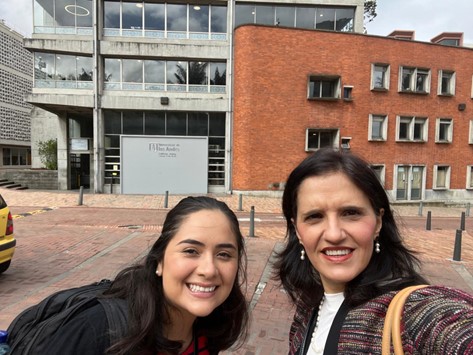With obesity cases on the rise in Latin America, Gabriela Proaño Caicedo, an FIU dietetics and nutrition PhD candidate, set out to research the contributing factors. Guided by her advisor Cristina Palacios, PhD, chair and professor of dietetics and nutrition, along with Rajiv Chowdhury, PhD, chair and professor of global health, and Carlos Espinal, MD, director of the Global Health Consortium, Proaño Caicedo conducted a study on the effectiveness, barriers, and facilitators of overweight and obesity prevention strategies in Colombia.
As part of the project, the researchers, in collaboration with partners at the Universidad de los Andes, carried out interviews with stakeholders like representatives from Colombian government agencies and NGOs. Their findings emphasized the connection between public policy and health outcomes, highlighting the challenges many communities face in implementing overweight and obesity prevention programs. Many of the interview participants reported that insufficient resources and lack of political will can inhibit program success, negatively impacting obesity rates in Colombia.
The results were published in The Lancet Regional Health-Americas and presented at the American Society of Nutrition conference in Boston, MA, and the Latin American Nutrition Congress in Cuenca, Ecuador. In Spring ’24, Proaño Caicedo, in recognition of her work, received the UGS Excellence Award for Outstanding Paper or Manuscript.

PhD Candidate Gabriel Proaño Caicedo with her advisor Cristina Palacios, PhD,
chair and professor of dietetics and nutrition at the Universided de los Andes in Colombia
Proaño Caicedo shares more about the study and what they found in the following Q&A.
Q: Tell us a bit more about the research you conducted.
Proaño Caicedo: The manuscript was a mixed methods research project that included a scoping review of the literature available on national obesity prevention strategies in Colombia, as well as interviews with several stakeholders that were involved in the implementation and evaluation of obesity prevention strategies, including physical activity programs, school lunch program, etc. The goal was to gather evidence on the effectiveness of these programs and be able to provide suggestions for future research done in this area.
Q: What were some of the key findings?
Proaño Caicedo: From the literature, we saw that an obesogenic environment, such as having a lack of access to healthy foods or safe environments to be physically active, can negatively impact an obesity prevention program, while having community engagement and flexibility around the program (e.g., accommodating participant schedules with various sessions or virtual options) can improve program success. In the interviews, the main barriers included political issues, insufficient resources, and lack of coordination between organizations and systems. Overall, this research highlights the need for more multisectoral approaches and collaborations to ensure sufficient support is provided to these programs and improves their effectiveness and sustainability.
Q: Was there anything that stood out?
Proaño Caicedo: That the main barriers to obesity prevention programs were political. These included corruption, lack of political will, and a lack of evaluation/access to the evaluations of these programs. These issues can be incredibly complex, but it is important to discuss them as they can significantly impact both the programs and the populations they serve.
Q: How do you envision your research contributing to advancements within the field of dietetics and nutrition?
Proaño Caicedo: I hope that this research encourages a more thorough investigation of specific obesity prevention strategies, and that it informs future programs not just in Colombia but also in other countries. It is important to not only conduct these evaluations but also transparently publish and disseminate them so that these learnings are shared. Doing so can help improve programs that support obesity prevention and improve nutrition and health outcomes.
